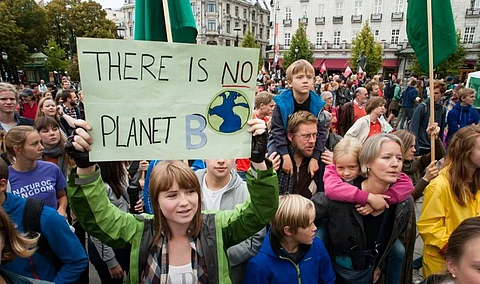COP28: A parent appeals for the future of her children
As the global community converges at the 28th Conference of Parties (COP28) to the United Nations Framework Convention on Climate Change summit in Dubai on November 30, a collective voice is rising — echoing from parents worldwide who have been steadfast participants in past COP events.
This COP, born out of introspection in the face of convening in a major oil-producing state like the United Arab Emirates, is not about boycotting but about engaging with urgency.
The tribe of mothers and parents recognise the critical need to explore alternative strategies for the sake of our children’s future. Messages from parental groups like Our Kids’ Climate, Mothers’ Rebellion, Parents for Future Global, and Warrior Moms are uniting under the hashtag #FromOurHearts, sending some powerful messages to COP28 and in the near future, adding one million parent voices.
As we approach COP28, it is imperative for citizens, parents, and the climate movement to align on common goals, particularly regarding fossil fuels. The crisis transcends environmental concerns, evolving into a pressing public health issue that threatens the very foundation of human existence. For the first time ever, health will be at the forefront of the climate conversation.
We aim to stress on equitable phase out and international cooperation, making these issues unavoidable through ‘real’ stories and pushing them into the forefront of technical negotiations for public attention and policy space transformation. The emphasis is on urging governments, utilising the COP platform, to advocate for an equitable end to fossil fuels.
Proposing a Fossil Fuel Treaty for a just transition in developing countries, the call is to secure normative language in the COP’s cover decision while engaging with specific agenda items.
This includes addressing the Global Stocktake, Mitigation Work Programme, New Collective Quantified Goal, and the Just Transition Work Programme. The goal is to establish the need for a global plan in the form of a Fossil Fuel Treaty to enable a just transition in developing countries.
The health hazards associated with fossil fuels span every stage of production, from extraction to refining and transportation. The economic toll of air pollution reached a staggering $8.1 trillion in 2019. Industries linked to fossil fuels pose severe health and environmental threats, impacting everyone from foetuses to adults with diseases like cancer, endocrine disorders, and early childhood birth defects.
Acknowledging past pitfalls, there is a stress on addressing equity, financial support, and technology transfer. Beyond negotiations, it is essential to spotlight governments committed to a just transition, holding all major fossil fuel players, including the United States, accountable.
While commending the leadership’s initiative in shedding light on the health impacts of climate change, there is a call for concrete action. The impending Global Stocktake serves as a stark reminder that countries are deviating significantly from their Paris Agreement commitments. This inaction perpetuates millions of premature deaths annually, along with both short- and long-term health repercussions and substantial economic burdens.
The urgent call is to prioritise air pollution on the agenda and spur national commitments and global funding to enhance air quality. Recognising air pollution as a global public health crisis and a contributor to climate change is imperative, with 99 per cent of the world’s population breathing air failing to meet World Health Organization guidelines. The primary culprits, the combustion of fossil fuels, not only emit greenhouse gases but also toxic pollutants.
The recent Intergovernmental Panel on Climate Change AR6 report underscores that taking action on clean air will yield significant global public health benefits, potentially being cost-negative. This includes saving lives, alleviating the burden of diseases, enhancing community health, and fortifying food systems.
For the first time ever, health will be at the forefront of the climate conversation. To fulfill the commitment to a transformative COP, it is crucial to outline specific measures to reduce air pollution, addressing the climate emergency while swiftly benefiting public health and economies.
Key interventions include shifting from coal to renewable energy, adopting electric vehicles, controlling diesel emissions, preventing crop and forest fires, and conducting comprehensive air quality monitoring.
Recognising the disproportionate impact of air pollution on certain populations, especially in low- and middle-income countries, emphasises the need to integrate air quality into global climate commitments and funding. A decisive move to end fossil fuel subsidies is essential, redirecting these funds to accelerate mitigation actions and a just transition, minimising the severe damage inflicted on both climate and health.
One billion children around the world are at extremely high risk. We are duty bound to act with — and for — children.
The breach of 2 degrees just two weeks ahead of COP28, is a warning for every decision taken on the table. As parents, we may not get another chance to reverse this. The urgency is clear, the call is loud, and the hope is that the leaders at COP28 will listen and act for a healthy future for all our children.
Bhavreen Kandhari is co-founder of Warrior Moms in India, a network of mothers pushing for clean air and climate action
Views expressed are the author’s own and don’t necessarily reflect those of Down To Earth


